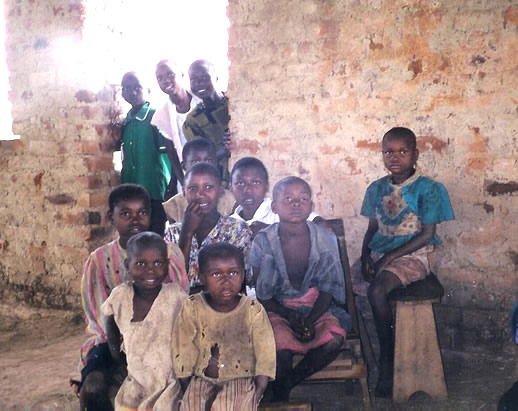|

"Children of a Ugandan Cooperative"
© A. James McAdams
Mythologies of Globalism
Many observers take the meaning of the word "globalism" for granted, as if we could all agree what topics should be subsumed under it, such as trade flows, currency valuations, the inculcation of western values, and political policies. Yet, nothing could be further from the truth. In fact, there is significant disagreement about whether the new age of globalism is even new. In this section, we will consider different ways of understanding the term, as well as its meaning for different worlds of development.
34. Wednesday, November 17Myth #1: Global Liberalism is Rational
How would you define the term "globalism"? Or "globalization"? Is globalism primarily an economic concept? Does it do more good than bad? More bad than good? Whatever we think of the phenomenon, is it something we can control?
(S) The West and the Rest, ch. 4
(CR) Jowitt, “Rage, Hubris, and Regime Change”Look for evidence:
35. Friday, November 19Discussion #12: Our Responsibility to the Developing World
It's easy to say that the problems of developing states like Uganda, Afghanistan, Burundi, and Haiti are immense and, in many cases, perhaps impossible to solve. But does this mean we should do nothing? Should we focus our attention only on some states? You are all studying at a Catholic university. Does Catholicism imply a special obligation to serve the poor?
Read and reflect:
Holy Cross MissionsLook carefully at the children in the photograph above. What are they thinking?
What is the common humanity they share with you?
How would you explain the American concept of "equality of opportunity" to them?
AND THANKSGIVING HOLIDAY
36. Monday, November 29
"Civilizations of Anger and Ressentiment"
Readings:
(CR) Gourevitch, excerpt from We wish to inform you . . .
(CR) Gannon, “Afghanistan Unbound”
37. Wednesday, December 1
Myth #2: Global Terrorism is Irrational
Terrorists must be crazy to commit the acts they do. Right? Some of those who sacrifice their lives in this fashion may indeed be a little irrational. But I doubt those who plan their attacks are irrational, let alone crazy. In my view, there is a harsh, cruel, and deliberate rationality to most terrorist campaigns. By the way, how do we determine who is a terrorist anyway?
Once you have taken a stand on these questions, ask yourself:
1. How should American best respond to terrorist attacks?
2. What kind of response will be most appropriate for our way of life?Readings:
(CR) de Gramont, “Transformation of Moral Idealism”
Readings from Terrorists: Osama Bin LadenResponding to Terrorists: "Inadmissible Evidence"
38. Friday, December 3Discussion #13: The Age of Misery vs. the End of History
Readings:
(CR) Fukuyama, “End of History”
(CR) Pfaff, “Progress”Take everything you have learned throughout this course and decide who is closest to the truth, Fukuyama or Pfaff. Hint: Pfaff is a Notre Dame alum.
39. Monday, December 6"Liberal Democracy: A Bias for Hope"
It's easy for political scientists in South Bend, Indiana (or for that matter, Cambridge, MA or Berkeley, CA or even the Stanford Jr. College)) to say that the world is going to hell and that there is no hope for most states in the world to become democracies. After all, we don't have to live in those places. But, I do have a bias for hope that the number of viable democracies will grow in my lifetime.
Readings:
(CR) Huntington, “New Era in Democracy”
(CR) re-read Fukuyama and Pfaff (above)Now, on the basis of these articles and my lecture, look at the following links about recent developments in Ukraine. What advice would you give Mr. Yushchenko about the potential prospects and potential pitfalls about Ukraine's march toward democracy? What can we learn from other cases of democratic transition?
Ukrainian Court Orders New Vote
Ukraine's Mr. Yushchenko
Let the Ukrainian People Go
Ukraine Leader Won't Halt VoteFor the pro-democracy site put together by the students of the Ukrainian Catholic University in Lviv (a partner of the Nanovic Institute for European Studies, see:
http://www.ucu.edu.ua/tak/eng/
40. Wednesday, December 8Myth #3: We are the End of History
We like to think we are the end of history because we know our own circumstances best. But who says we are the point of it all? What if we are not?
Readings:
(CR) Orenstein, “Stepford is us”
(CR) passage from EcclesiastesAnd,
Who needs us? . . . Who, indeed?
WebCT / McAdams / Notre Dame
Course Plan / Modern Nation-State/ Liberalism / Leninist Alternatives / Ressentiment of the Rest